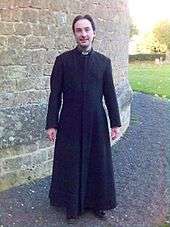cassock
English

Etymology
From Middle French casaque (“cloak”).
Noun
cassock (plural cassocks)
- (obsolete) A military cloak or long coat worn by soldiers or horsemen in the 16th and 17th centuries. [16th-17th c.]
- (obsolete) A coarse, loose cloak or gown, worn by women, sailors, shepherds, countryfolk etc. [16th-17th c.]
- An item of clerical clothing: a long, sheath-like, close-fitting, ankle-length robe worn by clergy members of some Christian denominations. [from 17th c.]
- 1918, W. B. Maxwell, chapter 10, in The Mirror and the Lamp:
- It was a joy to snatch some brief respite, and find himself in the rectory drawing–room. Listening here was as pleasant as talking; just to watch was pleasant. The young priests who lived here wore cassocks and birettas; their faces were fine and mild, yet really strong, like the rector's face; and in their intercourse with him and his wife they seemed to be brothers.
- 1956, Delano Ames, chapter 13, in Crime out of Mind:
- In one of the aisles there was an elaborately carved confessional box and I recognised the village priest in his heavy mountain boots and black cassock as he entered it and drew the dark velvet curtains behind him.
-
Coordinate terms
items of Christian clerical clothing
Translations
item of clerical clothing
|
|
This article is issued from
Wiktionary.
The text is licensed under Creative
Commons - Attribution - Sharealike.
Additional terms may apply for the media files.